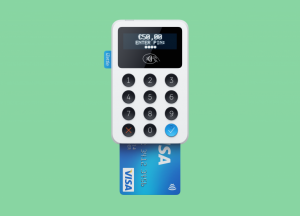In its biggest acquisition yet, PayPal Holdings Inc. is buying Stockholm-based payments firm iZettle AB for $2.2 billion.
The San Jose, Calif.-based online payments provider late Thursday confirmed an afternoon of rumors about the pending deal. Jacob de Geer, iZettle’s chief executive and co-founder, will stay on after the acquisition’s expected third-quarter close and report to PayPal chief operating officer Bill Ready, according to a PayPal news release.

Founded in 2010, iZettle often is called the “Square of Europe” for the similarities of its business model with that of San Francisco-based Square Inc., which started out by providing tiny businesses and part-time sellers with a dongle for smart phones so they could accept credit and debit cards. IZettle targeted small and mid-size businesses with its mini chip card reader and has branched into other payments niches, including point-of-sale software, e-commerce, and contactless payments.
IZettle now serves nearly 500,000 merchants. Upon closing, PayPal said it will gain in-store capabilities in 11 markets: Brazil, Denmark, Finland, France, Germany, Italy, Mexico, Netherlands, Norway, Spain, and Sweden.
“Small businesses are the engine of the global economy and we are continuing to expand our platform to help them compete and win online, in-store, and via mobile,” PayPal president and chief executive Dan Schulman said in the release. “IZettle and PayPal are a strategic fit, with a shared mission, values and culture—and complementary product offerings and geographies.”
PayPal said iZettle expects to generate gross revenues of $165 million in 2018, with approximately $6 billion of anticipated total payment volume on its platform. The company’s revenues have grown at a compounded annual rate of about 60% from 2015 to 2017. On a stand-alone basis, iZettle expects to reach profitability as measured by earnings before interest, taxes, depreciation and amortization (EBITDA) by 2020.
Just last week, iZettle had announced plans for an initial public offering, with its shares to be listed on the Nasdaq’s Stockholm exchange.
“The combination of iZettle and PayPal will provide tremendous benefits to our merchants who will have access to an even wider range of tools to help them get paid, sell smarter, and grow,” de Geer said in the release.
For PayPal, iZettle “will expand their product range and expand their customer list into Europe,” payments analyst Lawrence Berlin, a senior vice president at Chicago-based First Analysis Securities Corp., tells Digital Transactions News. The deal also will deepen PayPal’s penetration in certain merchant verticals, especially restaurants and coffee shops, he adds.
Sanjay Sakhrani, an analyst at New York City-based investment firm Keefe, Bruyette & Woods, said in a research note that “we think the potential acquisition of iZettle makes strategic sense for PayPal as it would broaden the company’s reach to SMB retailers internationally, support its omni-channel strategy, and help accelerate its digital-wallet acceptance initiatives at retailers.”
Sakhrani also noted that PayPal Here, a smart-phone-based payment service that competes with Square, has “a lack of traction” in the U.S., but “iZettle seems to be more penetrated in the market relative to other competing products.”
The pending deal also could help PayPal recover its merger mojo after the debacle of its TIO Networks Corp. acquisition last July. PayPal paid $238 million for the Vancouver, British Columbia-based bill-payment kiosk provider, but suspended its operations in November because of a data breach that potentially affected about 1.6 million customers. In a recent regulatory filing, PayPal reported that “in March 2018, our management decided to wind down TIO’s operations.” PayPal took a $25 million restructuring charge in relation to that action and a global workforce reduction.





